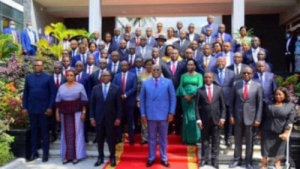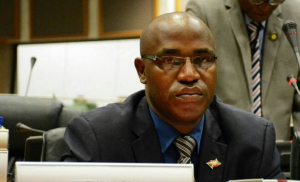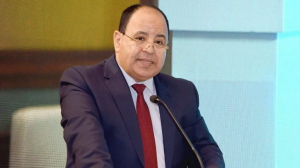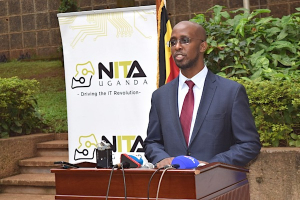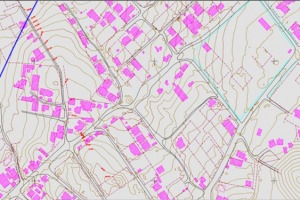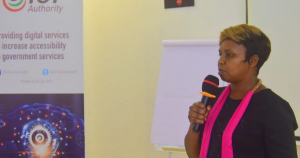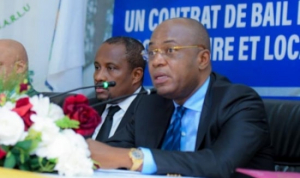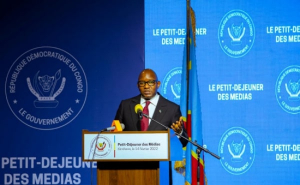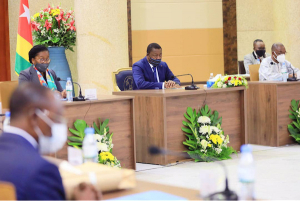DRC digitizes its tax collection with LOGIRAD
The LOGIRAD is DRC’s new integrated public finance management system. It was adopted last Friday, March 25th, in Kinshasa, during the council of ministers.
The new digital system is aimed at making the collection of taxes, duties, and fees more secure for the central government. Additionally, LOGIRAD will help the government optimize domestic revenue mobilization, knowingly by helping it better manage administrative and legal disputes, protect the tax collection circuit, limit human intervention and tackle fraud.
Per Article 3 of the tax law No. 13/003 of February 23, 2013, amended and supplemented by Article 47 of the 2022 finance law, the Democratic Republic of Congo will issue a statutory law, making LOGIRAD the compulsory platform for tax and non-tax procedures.
In the country’s 2022-2024 medium-term budgetary framework presented in September 2021, the Ministry of Finance makes LOGIRAD a key asset in the public revenues’ protection arsenal. The digital system is expected to heavily contribute to the collection of additional revenues for the implementation of essential socio-economic development projects.
According to DRC’s medium-term budgetary framework, provincial governments’ overall expenditure budget over 2022-2024 amounts to some FC89,999.8 billion (US$44.7 billion) against FC74,797.8 billion for the central government.
Muriel Edjo
Burundi validates digital communal tax collection project
Burundi validated last March 17 the final plan of its digital tax collection project. The plan was validated by provincial governors, council tax officers, and communal administrators during a workshop organized by the Ministry of Home Affairs and the United Nations Development Program (UNDP).
The final plan provides for the adjustment of the legal framework, identification and allocation of identification numbers to every taxpayer, and the acquisition and deployment of IT equipment. It also plans for the connection of every municipality to the national power and internet network as well as training for the communal staff that will be in charge of daily communal revenue collection. The plan’s pilot phase will be launched next July in sixty townships.
For Niteretse Martin (photo), permanent secretary of the Ministry of Home Affairs, the collection of communal tax revenues is being digitized to improve efficiency, boost transparency and improve the relationship between the public administration and citizens by offering efficient services to users.
The March 17 workshop is the ultimate result of instructions issued by President Evariste Ndayishimiye at the end of the January 4-5, 2022, government retreat. After the retreat, on January 27, another workshop was organized to validate the diagnostic assessment of communal tax collection in the country. The digitalization of communal tax collection is perceived as a solution to poor communal management. The latter translates into financial losses for the government. However, the authorities expect digitalization to guarantee good governance and steady communal tax incomes.
Ruben Tchounyabe
Egypt automates its tax system to improve collection
Egypt’s Ministry of Finance, on March 9, commissioned German software provider SAP and US tech firm IBM Consulting to install a digital platform for the country’s tax procedures. This move aims to improve tax procedures and optimize revenue collection.
The two contractors will roll out an integrated solution based on the SAP® Tax and Revenue Management for Public Sector. Designed to provide the Ministry of Finance with comprehensive business automation tools, the platform will help the Ministry streamline and automate its processes, enhance collaboration and improve citizen experience. The system was successfully tested in 10 tax offices in Greater Cairo but this year, it will be rolled out in every region.
Under the terms of the contract binding the three parties, IBM will also install IBM Cloud Pak for Business Automation solution, a tool designed to integrate artificial intelligence (AI) into the ministry of finance’s processes. It will streamline and automate the tax procedure, ensuring accurate tax declarations, offering taxpayers more knowledge of the taxation process while allowing tax authorities to focus on high-value tasks like reducing tax evasion and improving revenues.
The project is part of the Egypt Vision 2030 development strategy launched in 2016. One of the main focuses of that strategy is the modernization of public services.
Meanwhile, the digitization of the tax system is part of the unified tax procedure law aimed at maximizing government revenues. On February 22, Ragab Mahrous, spokesperson for the Ministry of Finance, explained that taxes account for 75% of the Egyptian government’s revenues. Therefore, it is crucial for the country, which has several development projects, to optimize tax collection.
Adoni Conrad Quenum
Digitalization saves Uganda US$1.1 bln spending annually (NITA-U)
Uganda started digitizing its public services more than 10 years ago. Subsequent achievements confirm the soundness of the decision that the Ugandan government took much earlier than most African countries.
Uganda saved an average of USh4 trillion (US$1.1 billion) yearly over the last ten years thanks to digitization. The figure was disclosed by Hatwib Mugasa, executive director of the country’s information technology authority NITA-U, in Kampala last Wednesday, March 23, during the Huawei ICT Congress 2022.
“This cost would have been spent on paper, manual processes, and data centers’ service fees for each ministry, department, and agency,” the government official explained. As part of its digitization project, the government has “rolled out over 4172km of backbone fiber cable in over 62 Districts of Uganda,” he added. It also includes “rolling out last-mile fiber cable to extend connectivity to the grass-root user all the way to the Parish.”
“In a few weeks from now we shall have completed 764km under the Last Mile Phase and citizens shall be able to access e-government services at 1,400 administrative locations,” he concluded.
The financial gains aside, digitization also helped save time for citizens who can now pay their taxes, request passports, and register a business online, Hatwib Mugasa indicated.
Uganda is currently one of the African countries with the highest e-government readiness score. In its latest "E-government development index 2020", the International Telecommunication Union ranked the country 18th out of 54 on the continent. The country's score of 0.4499 out of 1 is above the East African (0.3738) and African (0.3914) average. In 2010, its e-government development score was 0.2812.
Adoni Conrad Quenum
Gabon to build a data center to store and secure cadastral data
Gabon will soon have a data center that will manage and store cadastral data, announced the Minister of Housing Olivier Nang Ekomie.
According to Le Nouveau Gabon, the Gabonese authorities deemed this measure necessary in an international context marked by the resurgence of cybercriminal attacks or computer hacking.
For the acquisition of supplies, installation, and configuration of the Data Center, tender documents have been prepared and sent to the Directorate General of Public Procurement (DGMP) for a no-objection opinion.
Gabon also plans to interconnect the provincial land registry offices to repatriate, centralize and process land information to carry out the work on the same information system. On this issue, tender documents have also been sent to the DGMP for a no-objection opinion.
SG
ICT: Kenya works on a digital master plan to accelerate development
In 2008, The Kenyan government started deploying a development vision that runs until 2030. Digital technology, a part of this vision, hadn’t attracted much interest in the past but the narrative has changed now.
Kenya's Ministry of Information and Communication Technology, Youth and Innovation has announced the elaboration of a national digital master plan. The 10-year plan, which was the focus of a validation workshop held last Friday, aims to advance Kenya’s socio-economic development by leveraging technology.
The strategy focuses on the following areas: digital infrastructure, digital services, and data management, digital skills, digital innovation, and digital business. It should help the country create wealth and jobs, in line with its 2030 Vision adopted on June 10, 2008.
Lucy Mulili (picture), Administrative Secretary at the Ministry of ICT, representing the Cabinet Secretary for ICT, Joe Mucheru, explained that “the document draws heavily on the 2019 National ICT Policy, which explains how ICT as a foundation creates a robust economy and thus improves the lives of Kenyans.”
The Kenyan government's strategic actions under the National Digital Master Plan reflect a commitment to advancing digitalization which the World Bank sees as an asset for development–and clearly demonstrated by Covid-19.
Under the new plan, Nairobi is set to, among others, lay 100,000 km of fiber optic cable–52,000 km for the government and 48,000 km for private companies– to provide reliable and affordable connectivity for all. It also plans to provide 1.2 million laptops to schools, train 350,000 teachers in the use of technology, and connect 40,000 schools to a sustainable Internet network. The plan should cost Sh5 billion ($43.7 million) to implement.
Adoni Conrad Quenum
Mauritius wants to attract digital nomads to revive its tourism industry
In the past decade, Mauritius has invested heavily in ICT to create a digital economy as announced in 2010. This has helped the country better cope with the economic crisis induced by Covid-19.
The Mauritian government has decided to leverage its digital assets to boost tourism, whose contribution to the country’s GDP plunged by 62.1% in 2020 due to Covid-19. From 19.5% of the GDP and $2.4 billion of revenues in 2019, the sector tumbled to 8.7% and $945.5 million in 2020.
Now, the Island no longer focuses on using the Internet and the web for tourism promotion; rather, it wants to build a robust digital environment to attract location-independent workers.
Last month, Nilen Vencadasmy (photo), chairman of the Mauritius Tourism Promotion Authority, started touring some African countries to sell this new vision. On 26th February, he was in South Africa which is considered an important market; 130,000 South Africans visited Mauritius in 2019.
The Premium Travel Visa is the first digital asset that Mauritius will use to achieve its new ambitions. Launched on November 16, 2020, this one-year renewable residence permit granted to non-Mauritian nationals is accessible online. The Mauritius Economic Development Committee specifies that applicants for this permit must meet several criteria, including not being involved in the Mauritian labor market, proving that the main place of business and the source of income and profits are outside Mauritius.
Mauritius' other digital assets are grouped into a digital ecosystem conducive to remote work. The country ranked 8th in Africa for average mobile Internet speed in January 2022 with 20.59 megabits per second (Mbps), as well as 7th in Africa for average fixed Internet speed with 19.88 Mbps, according to Speedtest Global Index.
As for the cost of the Internet, Cable.co.uk, in its report "Worldwide mobile data pricing 2021. The cost of 1GB of mobile data in 230 countries," ranks Mauritius 5th in sub-Saharan Africa for the average cost of accessing 1 Gigabit (GB): $0.75. The Portulans Institute and STL's Network Readiness Index 2021 rank the country among the best in Africa in terms of Internet coverage. In the International Telecommunication Union's (ITU) Global Cybersecurity Index 2020, Mauritius ranks first in the level of security of its information systems since 2014.
By targeting digital nomads, Mauritius, which plans to "relax the entry protocol in the coming weeks," according to Nilen Vencadasmy, hopes to once more make tourism a strong contributor to GDP, not only by ensuring that the industry regains its previous dynamism but also by attracting quality visitors.
Muriel Edjo
DRC Govt digitizes lease contracts to secure rental property tax revenues
The DR Congo government has unveiled plans to digitize lease contracts. The strategy was launched last February 18 by Gentiny Ngobila Mbaka (pictured), governor of Kinshasa.
The government aims, through this plan, to create a database of rental properties so that it can easily identify both the owners and the tenants. This, in turn, will contribute to an efficient collection of rental property tax revenues.
The project will allow "the tax and financial service of the city of Kinshasa to monitor, in real-time, what the taxpayer has already paid. The city of Kinshasa, for its development, needs the participation of all Kinois (residents of Kinshasa, ed). The lease contracts are an important source of revenue because those subject to the tax on rental income are numerous and if they regularly paid this tax, the city would have the means of its policy," said the governor. The digitization project has been entrusted to the company Okab. The latter will provide the housing departments of the twenty-four communes of Kinshasa with the computer hardware and software necessary for the registration of rental contracts or books and the identification of lessors and tenants.
Ordinance-Law 69-006 of 10 February 1969 on the real tax of DR Congo stipulates in its "Chapter II: Taxpayers", Article 8, that "the property tax is due by the holder of the right of ownership, possession, emphyteusis, surface area, transfer, concession or usufruct of the taxable property, as well as by persons occupying, by a lease, real estate that is part of the private domain of the State, the provinces, the cities, and the communes, or of the assets of the districts."
Chapter III: Determination of the tax rate emphasizes in Article 13 that "an annual lump-sum tax is instituted as a property tax on built and unbuilt properties, the amount of which varies according to the nature of the buildings and the rank of the localities.”
Governor Gentiny Ngobila Mbaka pointed out that field teams in charge of digitizing lease contracts have already been trained and will soon be deployed first in the commune of Gombe which will serve as a pilot commune for the project.
Muriel Edjo
DRC introduces new portal to improve visibility
Since coming into power in 2019, Felix Tshisekedi has made the digital sector a tool for growth in the DRC. The Digital sector has been used to support the various economic sectors and is now being used to restore the country's brand image at the national and international levels.
The various ministries, presidency departments, and other public institutions of the Democratic Republic of Congo now have a digital platform where they can officially communicate. The portal www.republique.cd was officially launched last February 14 by Prime Minister Jean-Michel Sama Lukonde Kyenge (pictured).
The new website will help harmonize government communication, authenticate information, and fight against fake news. It is touted as the "digital gateway" of the DRC. According to the Minister of Digital Affairs, Désiré Cashmir Eberande Kolongele, the platform will centralize all official information - meeting minutes, report publications, activity announcements, etc. – so that they are easily accessible to Internet users. Currently, DRC has more than fifty ministries, plus large administrative departments. Many of them do not have an Internet presence, which often makes it difficult to authenticate the information from them.
"I wanted to invite the various public administrations, starting obviously with the ministries, the services of the presidency, and other institutions to use this portal and bring reliable information. We aim to give people first-hand and true information through this portal," said the Minister of Digital Affairs.
The project is part of the sectoral digital policy adopted by the government when it was creating the dedicated ministry on April 26, 2021. One of the components of this policy is to build “the brand image of the Republic and ensure visibility at the international level.”
The government also plans to adopt a state brand through a common visual identity for all websites of ministries and public institutions. Twitter accounts will also be opened and certified for all government entities.
Adoni Conrad Quenum
Togolese govt adopts draft bill to digitize visa and residence permit application processes
Togo wants to leverage digital technology to achieve inclusive and sustainable economic growth. To this end, it has established the Togo Digital Agency, which will help the government implement digital projects.
Last Monday, Feb 7, Togo's Council of Ministers adopted a draft bill aimed at accelerating the digitization of visa and resident permit applications and issuance. The meeting was held in Kara (412 km north, from Lomé).
"The main purpose of this draft bill is to update the general rules applicable to the entry, stay, movement, and settlement of foreigners on Togolese territory. In particular, it provides for the digitization of the process of applying for and issuing visas and residence permits," said the Council's statement.
The adoption aligns with the third axis of the government's roadmap, which aims at "modernizing the country and strengthening its structures."
Pending the bill's implementation, foreigners can still get their visas (tourist, diplomatic, business) at Togolese consulates and embassies (which can also issue immigrant visas for Togo).
On the territory, visas on arrival are issued by immigration services at the borders and the Gnassingbé Eyadéma International Airport. They are valid for a maximum period of 7 days, according to available information, but can be extended to a month at the Foreigners and Passports Office. For other types of visas, it is the Direction générale de la Documentation Nationale (DGDN) that handles related procedures.
Ayi Renaud Dossavi


